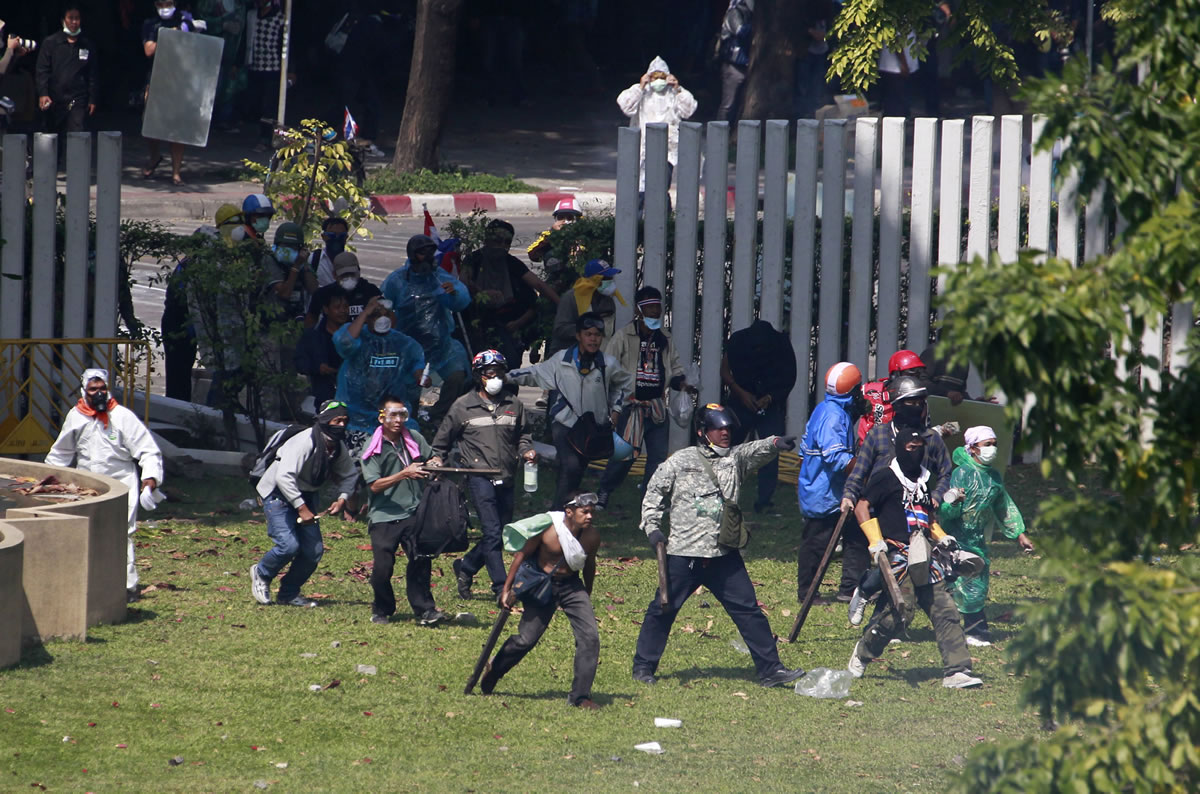BANGKOK — Thailand’s powerful army chief on Friday issued his strongest call yet for the nation’s political rivals to overcome their bitter divide, refusing to rule out the possibility of a military coup as long as the conflict threatens to tear the country apart.
Gen. Prayuth Chan-ocha made the comments one day after protesters trying to stop February elections battled with police in Bangkok in clashes that left two people dead and injured more than 140, one of the most violent days since the conflict began two months ago.
The crisis has seen Thailand wracked by political tensions in which demonstrators have sought to overthrow the democratically elected government of Prime Minister Yingluck Shinawatra. The army has staged 11 successful coups in the country’s history — the last against Yingluck’s brother in 2006 — so Prayuth’s words carry great weight.
Asked whether a military takeover was possible, Prayuth said simply, “That door is neither open nor closed … it will be determined by the situation.”
Protesters have lobbied for the army to intervene in the crisis, and their leader, Suthep Thaugsuban, has called on the military to take sides. Late last month, they forced their way onto the grounds of army headquarters to deliver a letter asking the military to support their campaign. Prayuth responded by insisting that the army would not take sides.
On Friday, he reiterated that stance, saying, “Please don’t bring the army into the center of this conflict.”
The deepening crisis took a turn for the worse Thursday after protesters tried to overrun a Bangkok sports stadium where election candidates were gathering to draw lots for their positions on ballots. Masked protesters fired rocks from slingshots as they tried to break into the building to halt the process, while police fired tear gas and rubber bullets.
Two people, including a police officer, were shot dead. Four election commissioners left the stadium by helicopter to escape the violence, some of the sharpest since a long-running dispute between Thailand’s bitterly divided political factions intensified anew in November.
As the violence unfolded Thursday, Thailand’s election commission called for the Feb. 2 polls to be delayed. That was a blow to Yingluck, whose ruling party won a landslide during the last vote in 2011 and would likely dominate any new election, thanks to her overwhelming support in the country’s north and northeast. The government rejected the call for the ballot to be delayed.
Deputy Prime Minister Surapong Tovichakchaikul said Friday that he would ask the military to provide security for the elections.
Prayuth said the army had shown “red traffic lights to both sides, so things will calm down,” and called for an end to street violence. “You ask, `Who wins?’ Who wins?’ No one,” he said.
Still responding to the question of possible military intervention, he said, “Whether it is going to happen, time will tell.”
But he also said: “We don’t want to overstep the bounds of our authority. We don’t want to use force. We try to use peaceful means, talks and meetings to solve the problem.”
Thailand has been plagued by political turmoil since the army toppled Yingluck’s brother, then-Prime Minister Thaksin Shinawatra, in a 2006 coup. In broad terms, the conflict pits the Thai elite and the educated middle-class against Thaksin’s power base in the countryside, which benefited from his populist policies designed to win over the rural poor.
The protesters accuse Yingluck of being a proxy for Thaksin, who lives in self-imposed exile to avoid jail time for a corruption conviction but still wields influence in the country.
An ill-advised bid by Yingluck’s ruling Pheu Thai party to push an amnesty law through Parliament that would have allowed Thaksin’s return from exile sparked the latest wave of protests.
Thaksin or his allies have won every election since 2001. His supporters say he is disliked by Bangkok’s elite because he has shifted power away from the traditional ruling class, which is represented in the current protest movement.
Since taking office two years ago, Yingluck has walked a careful tightrope with the army, and during the latest crisis she has gone out of her way to avoid violence for fear of worsening the conflict or provoking a coup.
Authorities have issued an arrest warrant for Suthep, the protest leader, on charges of insurrection. But police have made no move to arrest him for fear of worsening the crisis.
Suthep is calling for an unelected “people’s council” to replace Yingluck’s administration, and he has vowed that the protesters will thwart the February polls through civil disobedience.



